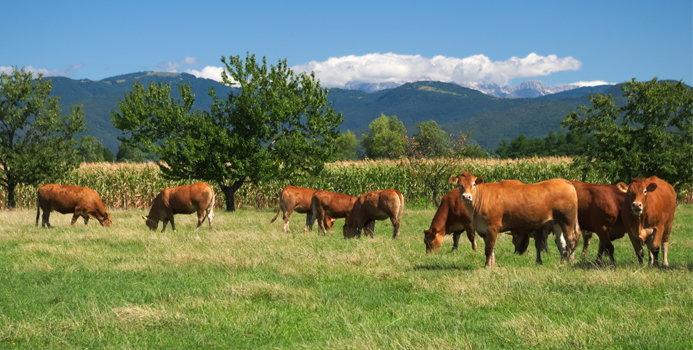Buying beef can be confusing in today’s grocery stores, with numerous claims about nutrition, antibiotics, hormones, and animal welfare presented on each label. With so many different choices, it can be frustrating for a consumer. Let's look specifically at the differences between beef labeled “grass-fed” and “organic.”
While shopping, keep in mind that above all, food companies are seeking a profit. They want shoppers to look at their label compared to other products and choose theirs. Because of this, they will add as many marketing claims as possible – many of which are not regulated. These claims can be used to deceive customers into thinking a product is healthier. Because of this, we need to be well-informed, smart consumers.
Why does it matter? Author Michael Pollan said, “You are what you eat eats.” In order to obtain the best possible nutrition from animal products, knowing what animals are eating is part of the equation. Nutritionally, grass-fed beef has a different fat profile, providing much higher levels of omega-3 fatty acids, which tends to be low in the typical American diet, and fat-soluble vitamins like A and E.
Further, those who are concerned about the animal’s welfare can look for some of these regulatory seals in order to decide between brands. Decide what you are looking for and do your research before going to the grocery store.
Cows naturally eat grass; feeding grain like corn or soy causes quick weight gain, which is beneficial in the eyes of manufacturers. All cattle eat grass and drink milk for the first 6-12 months of life; after weaning, most are shipped to feedlots and “finished” on grain feed for the rest of their lives. Growth hormones are often administered as well in order to stimulate fast weight gain. Because grain-finished cattle gain weight so quickly, they can be slaughtered at a younger age.
In order to display the U.S. Department of Agriculture (USDA) “grass-fed” certification, grass and other field greens must make up an animal’s diet for its entire life after weaning. For beef products, cattle must have access to pasture during the growing season, which varies across the country. There are no guidelines on antibiotics or hormones under the grass-fed seal.
On meat packaging, be on the lookout for vague terminology about pasturing or natural feed. Terms that can cause confusion are “pasture-raised,” “naturally-raised,” or “free range,” which are concerned with the lifestyle of the animal but not what the animal is eating. If you are primarily concerned with animal welfare, a separate set of terms and regulations should be investigated.
Beef displaying the USDA organic seal must be from cattle that meet the USDA National Organic Program requirements. These animals must be raised on certified organic land and fed organic feed. No antibiotics or growth hormones are allowed, and the cattle must have outdoor access. Note that they must be fed organic feed, but what the feed contains is not defined; therefore, cattle can be fed organic grain and still be labeled as organic.
Many terms can appear on products without an accompanying seal. Unless it has the USDA shield, there's a chance that the animal was raised according to less exacting standards. For example, vague phrases like "no antibiotic residues" are not covered by the USDA and could be used by a producer who administered antibiotics at some point during the animal's life.
Nutrition labels are further complicated by the fact that some contain certifications from several organizations, not just the USDA. Some of these independent organizations have stricter guidelines regarding the animal’s living conditions. Check the organization’s website to see how their terms are defined.
If you are looking for beef from cows that were fed what they naturally eat and is free of antibiotics and hormones, purchase beef that is certified as both grass-fed and organic. Decide what is most important to you in a beef product in order to support companies that align with your priorities.
Carolyn McAnlis, RDN, is a Registered Dietitian Nutritionist who has a special interest in preventing chronic disease through nutrition. She graduated from Syracuse University with a Bachelor of Science in Nutrition Science & Dietetics and a minor in Psychology. After completing a full-time dietetic internship at the University of Virginia Health System, she has developed a passion for convincing others that healthy food can be delicious through her blog A Dietitian in the Kitchen.



